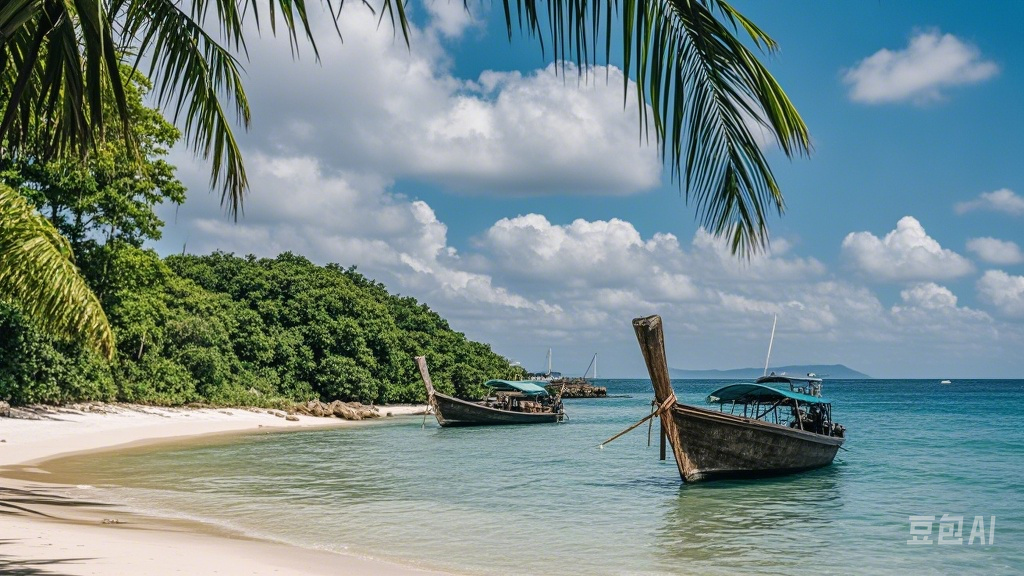Phu Quoc, often called the “Pearl Island” of Vietnam, is a tropical paradise in Thailand’s Gulf. Phu Quoc has rapidly become one of Southeast Asia’s premier vacation destinations known for its stunning beaches, lush landscapes, and vibrant marine life. Beyond its natural beauty, the island offers a rich tapestry of cultural and historical experiences, making it an ideal spot for relaxation and exploration.
Natural Attractions
Beaches and Islands
Phu Quoc boasts some of the most pristine beaches in Vietnam, each offering a unique charm. With its powdery white sand and turquoise waters, Sao Beach is perfect for sunbathing and swimming. Long Beach, stretching over 20 kilometers, is ideal for those seeking a more vibrant atmosphere with its array of beach bars and restaurants. For those interested in exploring beyond the main island, the An Thoi Archipelago offers a series of smaller islands perfect for snorkeling and diving. These islands are home to vibrant coral reefs and diverse marine life, providing unforgettable underwater adventures.
National Parks and Wildlife
Phu Quoc National Park covers more than half of the island, offering a haven for wildlife and nature enthusiasts. The park has various flora and fauna, including several endangered species. Dense tropical forests, mangrove swamps, and mountains provide diverse habitats for wildlife, such as macaques, hornbills, and the rare Phu Quoc Ridgeback dog. Hiking trails and guided tours allow visitors to explore the park’s natural beauty while learning about conservation efforts to preserve these ecosystems.
Cultural and Historical Aspects
Local Culture
Phu Quoc’s cultural landscape blends Vietnamese and Khmer influences, reflected in its local crafts, cuisine, and traditions. The island is famous for producing fish sauce, a staple in Vietnamese cooking, and pepper farms that produce some of the world’s finest black pepper. Visitors can tour these farms and factories to learn about traditional production methods. The island’s night markets offer a vibrant culinary experience, where visitors can sample local delicacies such as grilled seafood, bánh xèo (Vietnamese pancakes), and fresh tropical fruits.
Historical Sites
Phu Quoc is a natural paradise and a place steeped in history. The Phu Quoc Prison, also known as Coconut Tree Prison, is a poignant reminder of the island’s past. Initially built by the French colonialists and later used during the Vietnam War, the prison now serves as a museum, offering insights into Vietnam’s turbulent history. Other historical landmarks include the Dinh Cau Night Market and the Cao Dai Temple, each providing a glimpse into the island’s cultural and spiritual heritage.
Tourism and Activities
Luxury and Relaxation
Phu Quoc has become synonymous with luxury and relaxation, offering many high-end resorts and spas. These establishments provide world-class amenities, including private beaches, infinity pools, and wellness centers. Guests can indulge in spa treatments, yoga sessions, and gourmet dining experiences, all set against the island’s stunning natural beauty; for those seeking a more secluded getaway, boutique resorts and eco-lodges offer tranquility and personalized service.
Adventure and Exploration
Beyond relaxation, Phu Quoc offers numerous opportunities for adventure and exploration. The island’s clear waters and diverse marine life make it a prime location for snorkeling, diving, and fishing. Kayaking through mangrove forests and exploring hidden coves add to the island’s appeal for outdoor enthusiasts. On land, visitors can embark on hiking trails through the national park, explore waterfalls, and discover the island’s rich biodiversity.
Development and Sustainability
Tourism Growth
The rapid growth of tourism in Phu Quoc has significantly impacted the island’s economy and infrastructure. While this development brings economic benefits, it also challenges the island’s natural environment and cultural integrity. The construction of resorts, roads, and other facilities has led to concerns about environmental degradation and the displacement of local communities.
Efforts for Sustainable Development
In response to these challenges, local authorities and businesses increasingly focus on sustainable tourism practices. Efforts include promoting eco-friendly accommodations, implementing waste management systems, and encouraging the use of renewable energy. Community-based tourism initiatives empower residents by involving them in tourism development and decision-making processes. These initiatives not only preserve the island’s natural and cultural assets but also ensure that the benefits of tourism are equitably distributed.
Conclusion
Phu Quoc is a destination that offers a perfect blend of natural beauty, cultural richness, and modern luxury. Its pristine beaches, vibrant marine life, and historical landmarks provide travelers with diverse experiences. As the island grows as a tourist hotspot, it is crucial to balance development with sustainability. By embracing responsible tourism practices, visitors can help preserve Phu Quoc’s unique charm for future generations, ensuring that it remains a hidden paradise for years.
